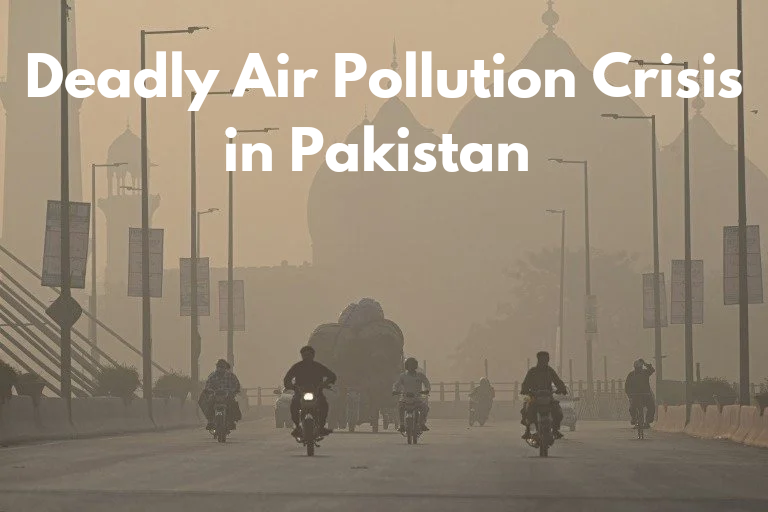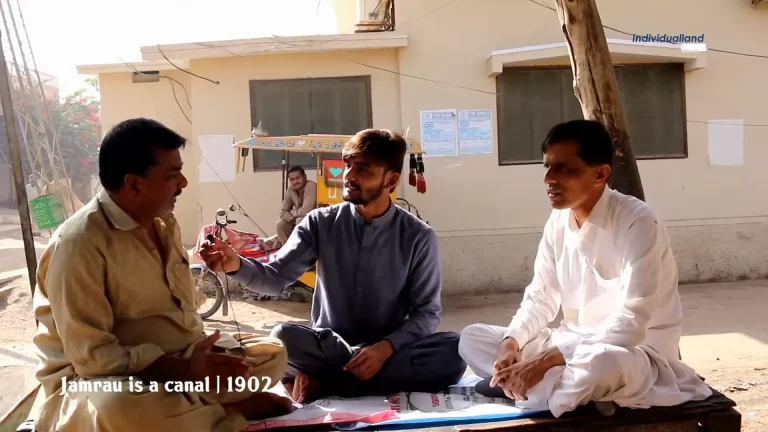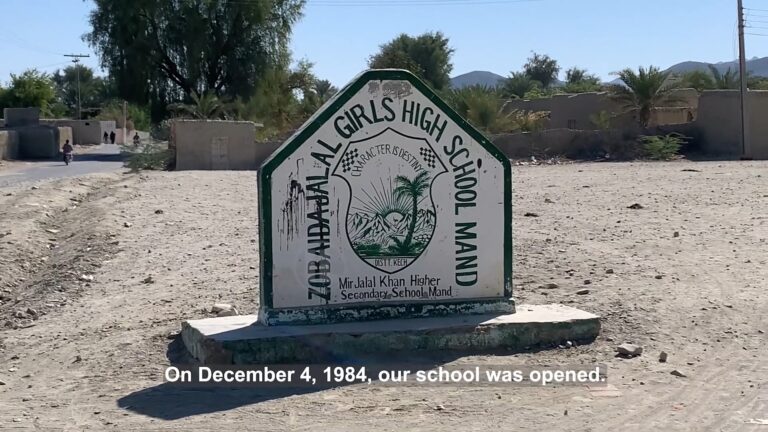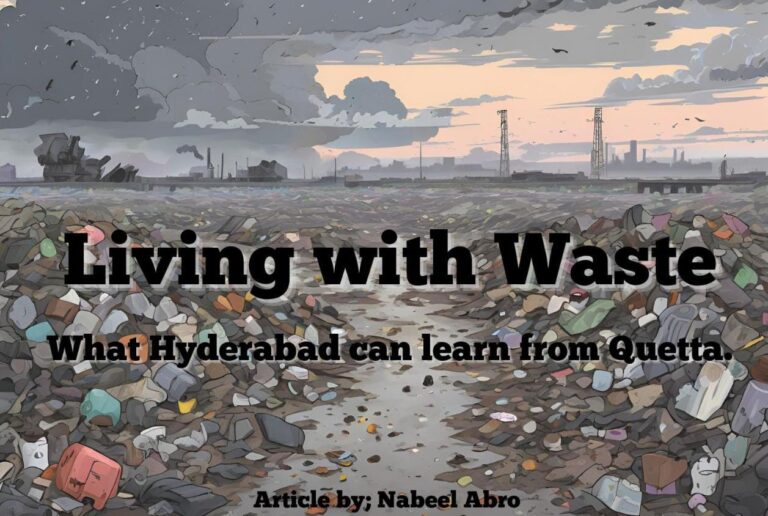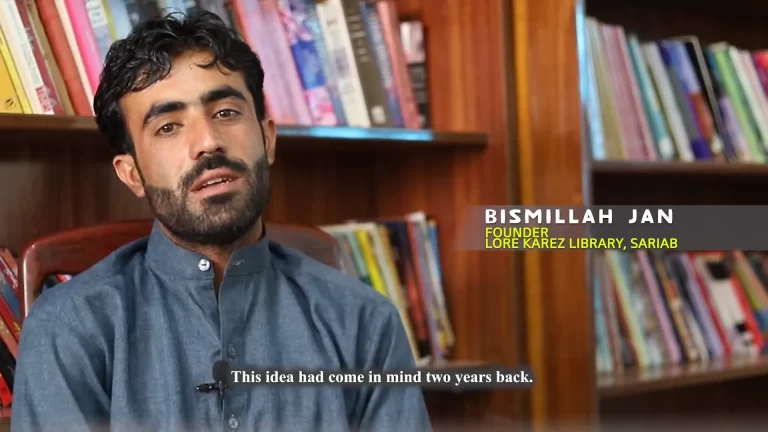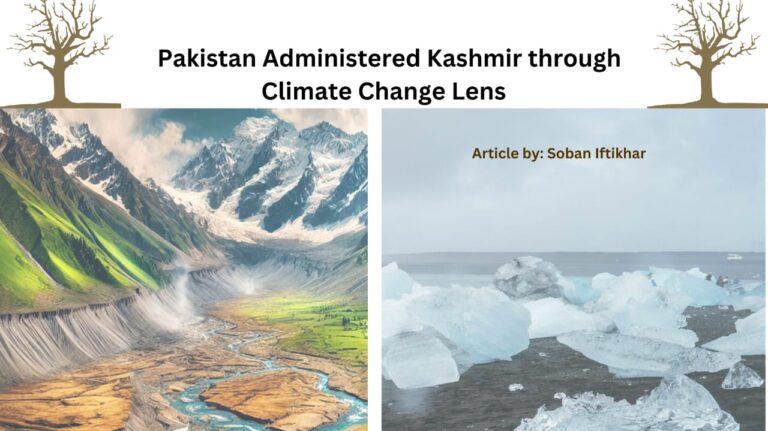Adapt and Thrive or Choke and Strive
Gujranwala, which was once renowned for its industrial prowess, is currently confronted with an air pollution crisis that poses a threat to the health and future of its residents, particularly women and children.
In a stark assessment, the World Health Organization (WHO) has declared air pollution a pressing global crisis, highlighting its severe impact on public health over the last two decades. Experts report that air pollution is the leading environmental factor contributing to health issues, resulting in approximately nine million deaths annually. Millions more are affected by respiratory and cardiovascular diseases, as well as cancer, underscoring the urgent need for action to combat this escalating threat to human health.
These concerns are echoed by Amina Bibi, a mother of two, who recounts the restless nights she experiences as a result of her children’s persistent coughing. She told this scribe “It’s heartbreaking to see them struggle, they cough whole nights, gasping for breath. The doctor warned me that their health is at serious risk, and it’s affecting their ability to concentrate in school. Their education is at stake, and I worry about the long-term effects this pollution will have on their future.”
Dr. Ayesha Khan, a pediatrician at Gujranwala General Hospital, has observed a surge in respiratory conditions among children, including frequent infections, bronchitis, and asthma. Talking to this scribe, she said, “The long-term damage could include compromised lung function and stunted cognitive development. This isn’t just about discomfort, but about the potential lifelong health burdens these children face.
Without a mask, I can’t even think about stepping outside. Winter hasn’t fully set in, yet the familiar, invisible shroud of smog is already here, blanketing the streets and neighborhoods.
Asma Tariq says that “As a journalist and climate change activist, my work demands that I immerse myself in the community, step outside, and be present in the world I write about. But when the air itself feels hostile, when every breath is labored, and every outdoor assignment becomes a health risk, my activism comes with a new level of urgency. I find myself covering my mouth and nose, not just as a precaution but as a necessity. For so many others in my city, it’s the same – people can’t work, children can’t play outside, and the elderly are trapped indoors, gasping for relief.
Asma Tariq says that “It’s not just air pollution; it’s a justice issue. Clean air, something so basic, should be a right, yet in Gujranwala it’s a privilege slipping further away each year. I can’t help but think that in a city of factories and relentless development, the promise of progress has come at the cost of our health. And in winter, the situation escalates – with the cold trapping pollutants close to the ground, making the air we breathe even denser, harsher. How can we speak of growth and development when our own environment is slowly suffocating us?”
Local health authorities note a disturbing respiratory diseases. As factories and brick kilns spew harmful pollutants like volatile organic compounds, nitrogen oxides, and particulate matter, a persistent, harmful smog forms, endangering residents’ health.
Gujranwala’s air pollution crisis has reached alarming levels, threatening the health of its residents, particularly women and children. According to the Pakistan Environmental Protection Agency, the city’s air quality exceeds safe limits by 300%, while the World Health Organization attributes 1 in 5 premature deaths in Pakistan to air pollution. Local health authorities report a 70% surge in respiratory diseases. The city’s industrial activities release hazardous pollutants, including volatile organic compounds, nitrogen oxides, and particulate matter, forming smog that causes heart disease, asthma, and respiratory disorders. Women face a 20% increased risk of respiratory issues, while children’s developing lungs are irreversibly damaged, and pregnant women.
The air quality of Gujranwala frequently violates national and global safety standards for particulate matter (PM2.5), according to a recent study published in Environmental Science and Pollution Research.
The severity of Gujranwala’s situation is further emphasized by the World Air Quality Report 2022 from IQAir. Cardiovascular and respiratory diseases, impaired cognitive development, and economic strains such as inflated medical costs, productivity losses, and property damage are directly associated with frequent violations of safe PM2.5 ni levels.
On air pollution and public health in South Asia, the World Bank said, “Without coordination, regions cannot reliably predict their future air quality. The long-range transport of pollution makes actual air quality improvements in a region dependent not only on local measures but also on measures taken In other areas. “But so far governments across the region have not made any concrete move toward such an initiative, although they have individually crafted and implemented some air-pollution mitigation policies and programs for their own countries.
Over the last two decades, air pollution has evolved into a global crisis, WHO says. The impact is stark. It’s the top environmental factor contributing to poor public health, experts say, leading to as much as nine million deaths worldwide annually, and to millions more people falling ill due to respiratory and cardiovascular problems, as well as cancer, among others.
Immediate interventions are recommended by experts, including the implementation of more stringent industrial emission regulations, the adoption of green technologies such as renewable energy and electric vehicles, and urban planning that prioritizes green spaces, efficient public transportation, and mixed-use areas.
WWF-Pakistan, the Gujranwala Environmental Club, and Students for Environmental Protection (SEP) are advocating for cleaner air, while activists such as Ali Hassan, the inventor of the Green Pakistan Movement, encourage government collaboration. Their advocacy encompasses the promotion of additional green spaces, the implementation of more stringent emission monitoring, and the provision of incentives for industries to employ clean technologies.
According to an IQAir report released in April 2023, South Asia remains the most severely affected region in the world for air pollution.
While the World Health Organization (WHO) recommends that average annual PM2.5 levels should not exceed five micrograms per cubic metre, last year saw Bangladesh, Pakistan and India among the countries with the worst air quality indices.
On World Tsunami Awareness Day, Punjab Chief Minister Maryam Nawaz Sharif highlighted the growing threat of natural disasters, particularly tsunamis, which are exacerbated by the adverse impacts of climate change. She emphasized the urgent need for Pakistan to develop a comprehensive, proactive approach to disaster management. Chief Minister clearly stated that the Punjab government is focusing on these issues by strengthening disaster preparedness through the Punjab Disaster Management Authority (PDMA) and covering climate resilience in its policies.
Punjab Chief Minister Maryam Nawaz Sharif in her message on World Tsunami Awareness Day said, “Natural disasters like tsunami are natural factors and calamities are increasing due to hazardous effects of climate change. Pakistan is also facing serious problems of climate change and we need to chalk out a robust plan to effectively cope up with natural calamities. We need to learn from international experiences and strengthen our strategy in order to deal with tsunami disaster.”
She said, “The Punjab Government has introduced a comprehensive climate policy which also encompasses protection of human life and property in times of natural calamities. Punjab Disaster Management Authority (PDMA) is being equipped and developed on modern lines. The Punjab government is going to hold regular awareness programmes in order to impart awareness to the citizens to counter natural calamities.” She added, “The citizens should be kept aware of precautionary measures in case of any untoward situation. Earthquake prevention techniques are being adopted during the course of carrying out infrastructure constructions in Punjab.
Maryam Nawaz Sharif,has advocated for “climate diplomacy” with India to address the issue of smog, particularly as winter approaches and pollution levels rise in both countries.
Punjab Chief Minister Maryam Nawaz on Wednesday reiterated her proposal for climate diplomacy with India over the subject of smog that has been determined to be a contentious issue straddling both sides of the border.
Chief Minister said :“We need to have diplomacy with India regarding the issue of smog in Lahore. I’m thinking of writing a letter to the Punjab Chief Minister [Bhagwant Mann] in India that this is not just a political issue, this is a humanitarian issue.”And if we’re also taking steps towards this, then there should be a matching response from the Indian side,” She said.
There is still more work to be done at the implementation level, even if Chief Minister Maryam Nawaz Sharif’s speech emphasizes how critical it is to confront climate change and natural disasters. It takes more than just the creation of policies to strengthen disaster management systems, improve climate resilience, and make sure the Punjab Disaster Management Authority (PDMA) is well equipped. Precautionary measures, such as earthquake protection strategies in infrastructure projects, must be strictly adhered to, and regular awareness campaigns must be successfully carried out. Translating these strategies into tangible, on-the-ground results to guarantee population safety and readiness is the true problem.
Nevertheless, significant change necessitates the collaboration of government, industry, and communities. Strengthened air quality regulations and health-focused urban policies can facilitate a transition to sustainability. Support for alternative transportation options and public health awareness campaigns are essential for the transformation of urban lifestyles.
The campaign for pure air in Gujranwala is a cry for human rights and environmental justice. Despite the formidable challenges ahead, Gujranwala can revitalize its legacy as a city that prioritizes health, sustainability, and resilience, rather than solely as an industrial hub, with the unwavering support of its community.
Disclaimer
We have made every effort to ensure the accuracy of the text and content on this website. Individualland and Friedrich Naumann Foundation do not accept responsibility for any unintentional omissions. We appreciate accurate information to enhance our work. The articles on this website are supported by Friedrich Naumann Foundation for Freedom Pakistan, but the views expressed here do not necessarily represent the views of the Friedrich Naumann Foundation for Freedom.

